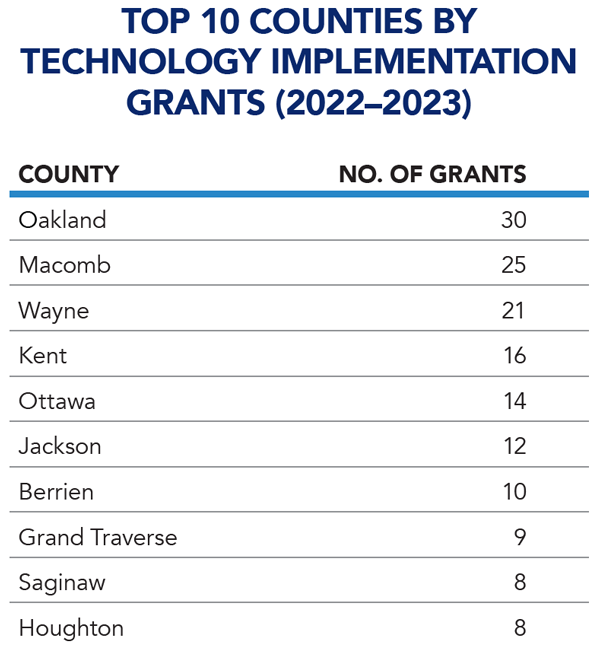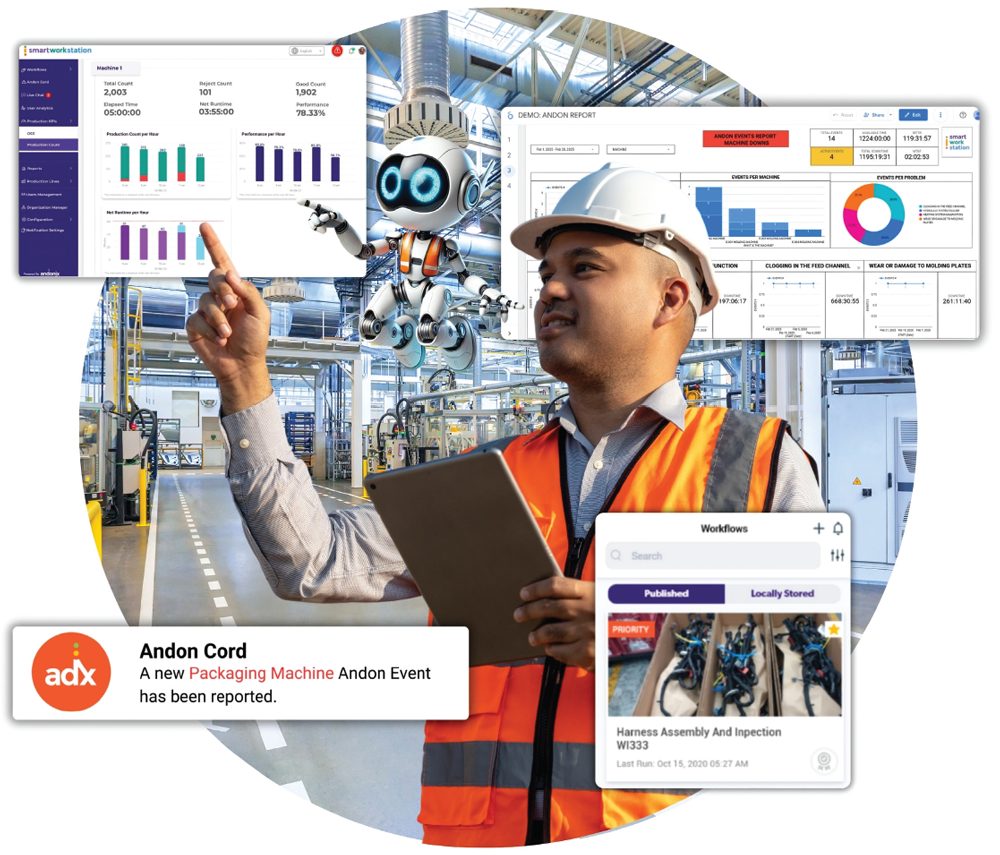If there is one company that embodies the future of manufacturing in Michigan, manufacturing technology solutions firm Andonix is it.
When the Michigan Economic Development Corporation (MEDC) launched the Industry 4.0 Technology Implementation Grant program to help prepare small and medium-sized manufacturers to adopt Industry 4.0 technologies by 2025, Andonix became one of the recipients. The grant was part of an overall $110,000 in support that the firm received from the initiative, which also included additional funds through the Industry 4.0 Accelerator in 2021.
2025 has arrived, and Andonix has gone beyond adopting Industry 4.0. It’s made that adoption a core tenet of its blossoming business.
“Since June 2021, Andonix has expanded on multiple fronts,” says Oliver Theiss, chief revenue officer at Andonix. “We opened our Detroit headquarters and joined Newlab at Michigan Central, an innovation hub that has quickly become a focal point for startups driving the future of mobility. Operationally, we launched our next-generation AI solution, AndiX, as part of our connected worker platform, enabling manufacturers to boost quality and productivity.”
Along the way, the company has also grown its total headcount by 40%.
“Our leadership team is proudly based in Michigan, with the remainder of our workforce operating remotely,” Theiss says. “In that same period (June 2021 to today), we’ve doubled our client base, moving beyond our initial focus on automotive into additional verticals like food and beverage, consumer packaged goods, and machinery. Today, we serve customers in four countries, including the U.S. and Mexico.”
The company’s partnership with the Industry 4.0 Accelerator has helped fuel that trajectory, he says.
“Their funding and support helped us amplify business development efforts, ranging from trade show participation and PR to direct client introductions. Andonix has been featured in prominent media outlets, including Fast Company and Fortune, and was named a ‘Best Small Company’ in Michigan. Additionally, the company represented Michigan on a 2023 trade mission to Mexico.”
Technologies eligible for the MEDC’s Industry 4.0 Technology Implementation Grant program include hardware/software related to the following Industry 4.0 categories, with preference given to transformative technologies (denoted with a * below):
- Additive Manufacturing and Advanced Materials*
- Artificial Intelligence*
- Big Data
- Cloud Computing
- Cybersecurity
- Industrial Internet of Things (IoT)
- Modeling, Simulation, Visualization, and Immersion
- Robotics/Automation*
- Connected Worker Platforms and Wearables
Over 2022-23, the program issued more than $5.8 million in grants across an astonishing variety of industries to 248 recipients in 50 of Michigan’s 83 counties. Among the companies are such names as Clips & Clamps Industries in Wayne County, Envision Automation in Cass County, World Magnetics Company in Grand Traverse County, Three Blondes Brewing in Van Buren County, Scientific Anglers in Midland County, and Orb Aerospace in Kent County.
Even a glance at the top 10 counties by number of grant recipients offers a fair approximation of how widely and deeply Industry 4.0 has become embedded in the Michigan economy:

Ideal Environment for Innovation
Fundamental to Andonix’s operations is the introduction of OpenAI into its “Andi” and now “AndiX” personal digital assistant platforms to connect manufacturing workers with their machines, allowing them to quickly identify, track, and resolve operating problems. So, as global manufacturing clusters go, how does Michigan’s stack up as a test bed and potential customer pool?
“Michigan is home to some of the most advanced, best-run factories on the planet, operating complex machinery and systems,” Theiss says. “Access to these demanding production environments allowed us to refine and validate our AndiX AI agentic solution and, more broadly, our connected worker platform against the highest performance and innovation standards. The result is a technology proven to meet modern factories’ rigorous productivity, speed, and agility needs.”
By being deeply immersed in Michigan’s manufacturing ecosystem, Theiss says, the company has developed and continuously improved its platform to generate real, superior value for clients operating in increasingly competitive and changing markets while also having a real sense for the needs of people working in factories.

Photo courtesy of the Executive Office of the Governor
“As such, our mission has evolved to make our technology people-centric,” he says, “seeking to deliver value also for the workforce and not just for our clients who employ them.”
That’s music to the ears of manufacturers, and a ringing endorsement for the attractiveness of a Michigan advanced manufacturing and technology ecosystem with few peers.
Shine Like a DIAMOnD
Critical partners in Michigan’s advanced manufacturing ecosystem are Automation Alley and the Michigan Manufacturing Technology Center (MMTC), the official National Institute of Standards and Technology’s Manufacturing Extension Partnership representative in Michigan, closely affiliated with the MEDC.
Through its five offices, the MMTC supports more than 12,000 small and medium-sized manufacturers who employ more than 410,000 people. “Approximately 51,000 openings for critical manufacturing jobs are expected per year between 2020 and 2030,” the organization stated in its 2025 annual report, “highlighting the need for comprehensive resources to help manufacturers streamline operations, address skills gaps, recruit and retain talent, and expand capacity to meet demands.”
In 2024, 584 MMTC manufacturing clients reported more than $104 million invested back into their operations, more than $158 million in sales growth, and 4,949 jobs created or retained.
Automation Alley is a nonprofit technology business association and Digital Transformation Insight Center that brings together industry, academia, and government. Among the newest projects with backing from both organizations is Project DIAMOnD, which stands for Distributed, Independent, Agile Manufacturing on Demand. It’s the largest blockchain-enabled 3D printer network in the nation, comprising 300 connected 3D printers distributed to small and medium-sized manufacturers through its grant program. “The sheer number of printers, connected through optimal security technology, is democratizing Industry 4.0 application and accessibility for even Michigan’s smallest manufacturers,” says the MEDC. Most recently, the program expanded into Oakland, Wayne, and Macomb counties.
“Today’s commitment by Oakland, Wayne, and Macomb counties to expand Automation Alley’s Project DIAMOnD will help us grow our economy, lower costs for small businesses, and build out the ‘Infrastructure for Innovation’ we need to lead the future.”
— Michigan Gov. Gretchen Whitmer, July 2024, announcing the expansion of the Distributed, Independent, Agile Manufacturing on Demand shared network of 3D printers for small manufacturers
“Project DIAMOnD was inspired during the dark days of COVID, born out of frustration about supply chain issues and dependency on overseas manufacturing,” said Oakland County Executive Dave Coulter at the summer 2024 announcement of the program. “It is giving Oakland County businesses access to 3D printing technology and training that is allowing them to dramatically cut production time and costs, as well as keep manufacturing right here in Michigan. After our initial investment of $25 million over two phases, we are thrilled that Macomb, Wayne, and the State of Michigan are joining the program to make it a regional and statewide priority — and an opportunity for global competitiveness.”
‘Vibe Manufacturing’
Automation Alley COO Pavan Muzumdar sees Project DIAMOnD as a signpost on the evolution of manufacturing from the process-driven industry we’re accustomed to seeing (“we bend metal,” “we form plastic”) toward a discipline based more on intellectual property.
“Additive manufacturing is driving that change,” he says. Most manufacturers see themselves as process experts, not IP holders. However, as computerization and digital technology streamline the process and automate it, it’s the IP that remains. “Additive manufacturing takes away the manufacturability constraint,” Muzumdar says.
It helps businesses like Unique Short Tree Design & Upholstery in Rochester Hills, which has used Project DIAMOnD support to create its own IP and compete on a level playing field. Just like the big 3D printing companies such as rocket maker Relativity Space and vehicle maker Divergent, companies like this “can now participate in the future of manufacturing,” he says.

Automation Alley COO
Pavan Muzumdar
But there remains plenty of interest from corporate giants.
“The reason Project DIAMOnD was designed was to be a replicable additive manufacturing system, attractive to a large organization too,” Muzumdar says, envisioning a company wanting to scale up production of components within a close-by ecosystem, build those components in parallel, and then aggregate them for assembly. “The other idea we’re thinking about is that, as import taxes are levied, a foreign entity can distribute its intellectual property on a network and produce it in the United States,” he says. “It’s the notion that once your design is developed and you have a smart product that is replicable, you don’t necessarily need to make it and ship it.”
Muzumdar sees 3D printing flipping the script one day soon. Instead of being a third choice after manufacturing processes defined by forming or subtracting (machining), a generative AI tool will spit out a 3D design conceived for additive manufacturing first. He even has a new term for it: Just like “vibe coding” describes the new breed of computer coding where the human employs an AI to write the code, we’re soon going to see the advent of “vibe manufacturing or vibe design,” Muzumdar says. “Describe what you want, and the AI is going to come up with a model or design. Then you put it into your CAD software and take it from there.”

